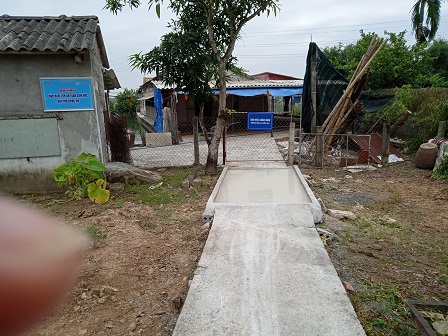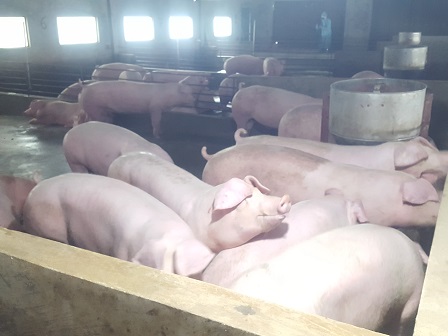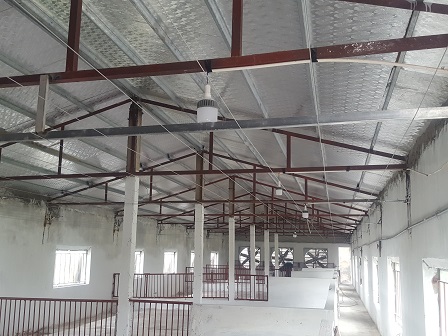A biosecurity model in small-scale pig production successfully developed in the North of Viet Nam

- A new gate with a disinfection hole built in front of the farm entrance
African Swine Fever (ASF) has attacked Viet Nam's pig industry since 2019, the disease quickly spread throughout 63 provinces and killed more than 20% of the country's pig head. Guiding pig farmers to strengthen the implementation of biosecurity measures at farms to prevent the disease has been an urgent need. In 2020, within the framework of OSRO/VIE/402/USA project, FAO Viet Nam ECTAD in collaboration with the Department of Livestock Production (DLP) developed 8 biosecurity model small-scale pig farms in the northern high-pig-population provinces of Bac Giang and Nam Dinh. The farmers were trained on good animal management practice and biosecurity in pig farming before setting up a model farm based on the actual baseline biosecurity status. Each model farm developed an action plan for improving biosecurity conditions and practices with FAO’s technical advisory and a small financial support of 1300 USD/ a model farm (if more than this amount would be needed, the model farms would pay with their own money). During the implementation of the model action plan, FAO technical consultants directly instructed the farmers how to make footbaths at entrance into farms and pig houses, make a place for changing clothes, slippers/ boots, washing hands before entering the farms. They also provided detailed advice to farmers on renovating the pig houses, removing lower part of the floor storing bathing water, refixing drinking nipples, making a new separated feeder for each pig cell, cleaning and disinfecting the pig houses and the farm, adding probiotics into feed and water to replace prophylactic antibiotics, collecting pig manure to compost with probiotics, recording production data.

- A new separated feeder made for each pig cell
On 15 and 16 November 2020, FAO Viet Nam ECTAD and the DLP organized two provincial workshops in Nam Dinh and Bac Giang provinces to advocate for the results, lessons learnt and promote expansion of the eight biosecurity-model small-scale pig farms. Ninety-three participants from DLP, National Agriculture Extension Center (NAEC), Department of Agriculture and Rural Development (DARD), Sub- Department of Livestock Production and Animal Health, Agriculture Extension Center of Nam Dinh and Bac Giang provinces, representatives of DARDs from neighboring provinces, FAO and model farmers attended the workshops. “Thanks to the application of biosecurity measures, their pig herds greatly reduced common diseases, such as cough and diarrhea, and grew faster, reaching the slaughter weight of 100 kg/ a head 15 days earlier than the previous herds when the farms had not participated in the modelling, the amount of antibiotics used also decreased by 40-50%” shared one of the model farmers.
The DLP’s Deputy Director, Mr Nguyen Van Trong affirmed “The model results have proved the effectiveness of biosecurity measures and changed the thinking of livestock production managers and farmers about biosecurity application in pig production, the implementation of the biosecurity was essential to prevent livestock diseases, especially ASF. The DLP would continue collaborating with FAO Viet Nam to improve biosecurity in livestock production to contribute to disease prevention, responsible antibiotics usage, and food safety”.
Nam Dinh and Bac Giang provinces proposed to find local resources to replicate the model and asked DLP and FAO to continue supporting them. Representatives of neighboring provinces appreciated the model results and said that the model development with detailed on-site technical advice, very low support costs, but such a clear effect gained was a new approach to them. Therefore, they requested FAO and DLP to support them in building some first model farms at their localities for further advocacy.

- A renovated pig house
